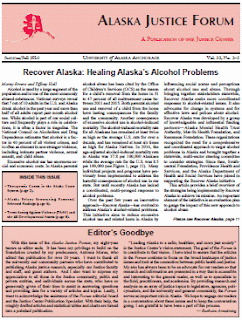The
Summer/Fall 2016 issue of the Alaska Justice Forum presents articles on the Recover Alaska initiative to address Alaska's alcohol-related problems; therapeutic courts in Alaska; findings of the Alaska Judicial Council's analysis of felony sentencing patterns in Alaska in 2012–2013; outcomes of the Teens Acting Against Violence (TAAV) program in Bethel seen through the lens of Search Institute's 40 Developmental Assets; and a farewell from Barbara Armstrong, whose eight-year tenure as editor of the Alaska Justice Forum is ending with this issue.
The 12-page issue includes the following articles:
This article provides an overview of the strategies being implemented by the Recover
Alaska initiative in its mission to reduce excessive alcohol use and related harm
in Alaska by influencing social norms and perceptions about alcohol use and abuse.
Includes a list of online resources.
Barbara Armstrong, editor of the
Alaska Justice Forum since 2008, is leaving the Justice Center at the end of December 2016.
Therapeutic courts — often called “problem-solving courts” or “wellness courts” —
have been a growing component of the U.S. court system since the 1990s. This article
provides an overview of the development of Alaska Court System therapeutic courts,
and describes the 12 therapeutic courts currently operating in Alaska as well as proposed
pilot project courts. Includes a bibliography.
This article describes selected findings from the Alaska Judicial Council's recently
released report
Alaska Felony Sentencing Patterns: 2012–2013. The report examines factors associated with felony sentences under new presumptive
ranges set by the Alaska Legislature in 2005 and 2006. The study has been used by
the Alaska Criminal Justice Commission (ACJC), established by the legislature in 2014
to make recommendations about criminal justice reform and sentencing.
Teens Acting Against Violence (TAAV) is a student-led anti-violence education group
formed in 1996 by Tundra Women’s Coalition (TWC) in Bethel, Alaska. This article looks
at the program in light of the 40 developmental assets defined by the Search Institute,
a nonprofit research program whose framework of strengths and supports for youth development
has become an international benchmark. While the developmental assets were not intentionally
incorporated in the design of the TAAV program, they are reflected in the program's
outcomes.
Jo Walker has joined the staff of the Justice Center as Academic Program Specialist,
and Tristian Monterastelli, has joined the Alaska Justice Information Center (AJiC)
staff as a Research Professional.

